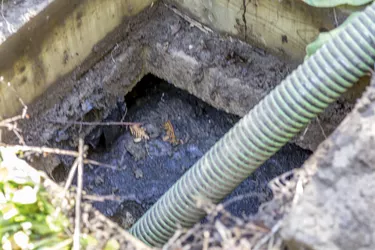
Homeowners get a lot of good news when tax time rolls around: You can claim the interest paid on your mortgage as a deduction and property tax assessments are a write-off as well. Those tax advantages are nice, but offset another financial truth of homeownership: home maintenance is expensive. Upgrades and maintenance to your personal residence, such as a replacement septic tank, are nondeductible expenses, although they may be able to help defer capital gains taxes when you sell your home.
Deductible Expenses
Video of the Day
The Internal Revenue Service only allows homeowners to claim four broad types of expenses as home-related deductions. Homeowners may claim interest charges against the amount borrowed for their mortgage – but not their entire mortgage payment – and any real estate taxes included in mortgage bills. Homeowners may also claim the cost of mortgage insurance premiums – but not homeowner's insurance or other types of policies – as a deduction. Property tax assessments may also be claimed. Homeowners who purchased points from their lender may claim the cost of the points in the year they purchased the home, but must amortized the deduction for points purchased to refinance a home over the life of the loan.
Video of the Day
Home Improvement Tax Credits
Although the IRS allows taxpayers to claim tax credits for a handful of home-improvement projects, a new septic tank doesn't qualify for any of the tax credits. Homeowners who install energy-efficient insulation, doors or windows, or an energy-efficient heating and cooling system may be entitled to tax credits up to a lifetime limit of $500 based on the cost of the items installed. In addition, homeowners who install solar water heaters, solar electric panels, wind energy generation systems or a geothermal heat pump may claim a tax credit of 30 percent, without limit, of the cost and installation of such items through tax year 2016.
Adjusting Your Home's Tax Basis
If your new septic system is a significant improvement in capacity over your old one, you may be able to use the expenses to adjust your home's basis, or the amount of money you spent on it, including purchase price and upgrades. If your new septic tank improves the value of your home, you may be able to include the upgraded amount – the new system's value less the old system's value – in your home's basis, potentially reducing the amount of gains – profit from the sale of the home – when you sell your home.
Deductions for Rental Property
If the homeowner installed the septic tank into a rental property, tax considerations change considerably. The IRS allows property owners to deduct expenses for upkeep of rental properties, even if they don't improve the value of the home. The cost of the septic tank for the rental property should be reported on Schedule C as an expense alongside rental income. The downside to this arrangement? Landlords must pay income taxes on rent they receive.